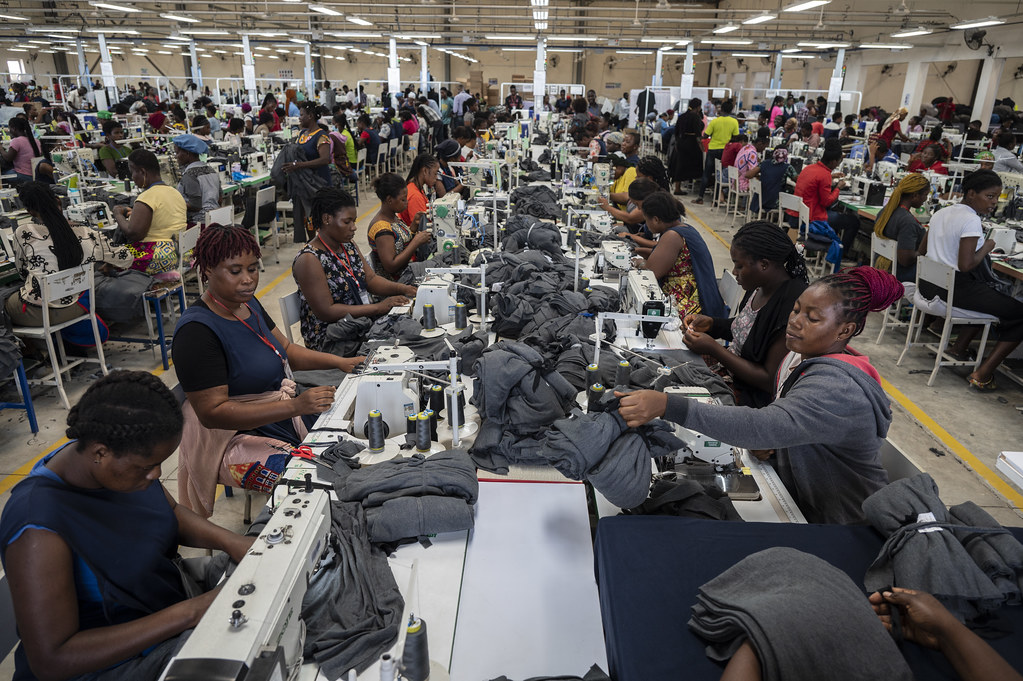
At Shona EPZ, a garment factory in Kenya’s capital, Nairobi, the future is uncertain for its workers as the African Growth and Opportunity Act (Agoa) is set to expire on Tuesday. For 25 years, the trade agreement has given some African goods duty-free access to the U.S. market, but the policy now stands at odds with the Trump administration’s record of imposing tariffs. Envoys from various African countries have gone to the U.S. to negotiate an extension, and a White House official told the BBC that the administration supported a one-year extension, but this has not yet been announced.
The fate of thousands of workers, like Joan Wambui, a 29-year-old who works at Shona EPZ, is tied to Agoa’s future. For Wambui, whose salary supports her four-year-old daughter, two sisters in college, and her mother, the loss of her job would be devastating. “If Agoa expires, where shall we go?” she asks. “It’s going to hit me hard. Starting to look for a new job. In Kenya it’s hard to find a job, very hard.” Kenya’s apparel industry has thrived under Agoa, exporting $470 million (£350 million) worth of clothing to the U.S. in 2024 and supporting more than 66,000 direct jobs, three-quarters of which are held by women.
The Impact on the African Economy
The uncertainty over Agoa’s future has already had an impact on factories like Shona EPZ. The factory, which normally produces nearly half a million garments each month, has seen its output slump to about a third this year as buyers hold back on long-term orders. Factory director Isaac Maluki tells the BBC that if the extension is not granted, the company may have to lay people off and possibly shut down. He says the $10 million investment the factory has made over the past seven years could “go down the drain.”
The uncertainty stretches far beyond Kenya. Across Africa, more than 30 countries export over 6,000 products to the U.S. under Agoa. The program has been credited with creating jobs, boosting industries, and giving African economies a stronger foothold in global trade. However, garment sales from Kenya have also been hit this year by the 10% tariff introduced by the Trump administration, and a renewal of Agoa would not remove that tariff, but it would prevent additional ones.
A Push for a New Trade Strategy
Trade expert Teniola Tayo says that African negotiators need to rethink their approach for a new deal, and “figure out what they want from the US and what they can offer.” Kenyan President William Ruto has been pushing for at least a short extension while also working to strike a bilateral deal with the U.S. South African President Cyril Ramaphosa has similarly warned that Agoa’s lapse would carry serious consequences for his country. At the same time, Kenya and other African nations are looking for new markets to reduce their overreliance on the U.S. Tayo says this should include taking advantage of the African free-trade area, arguing that “When Africans trade amongst themselves, they tend to produce higher-value goods.”
What The Author Thinks
The uncertainty surrounding Agoa highlights a conflict between a long-standing U.S. foreign policy of “aid through trade” and the current administration’s “America First” rhetoric. The lack of a clear, long-term extension signals a shift in priorities that could have devastating consequences for African economies. For African nations, this uncertainty is not just a trade issue but a matter of economic and social stability. It forces them to reconsider their reliance on a single market and to look for new trade opportunities, both bilaterally and within Africa itself. The situation is a powerful reminder that political shifts in one country can have far-reaching and life-altering consequences for people thousands of miles away.
Featured image credit: International Monetary Fund via Flickr
For more stories like it, click the +Follow button at the top of this page to follow us.
